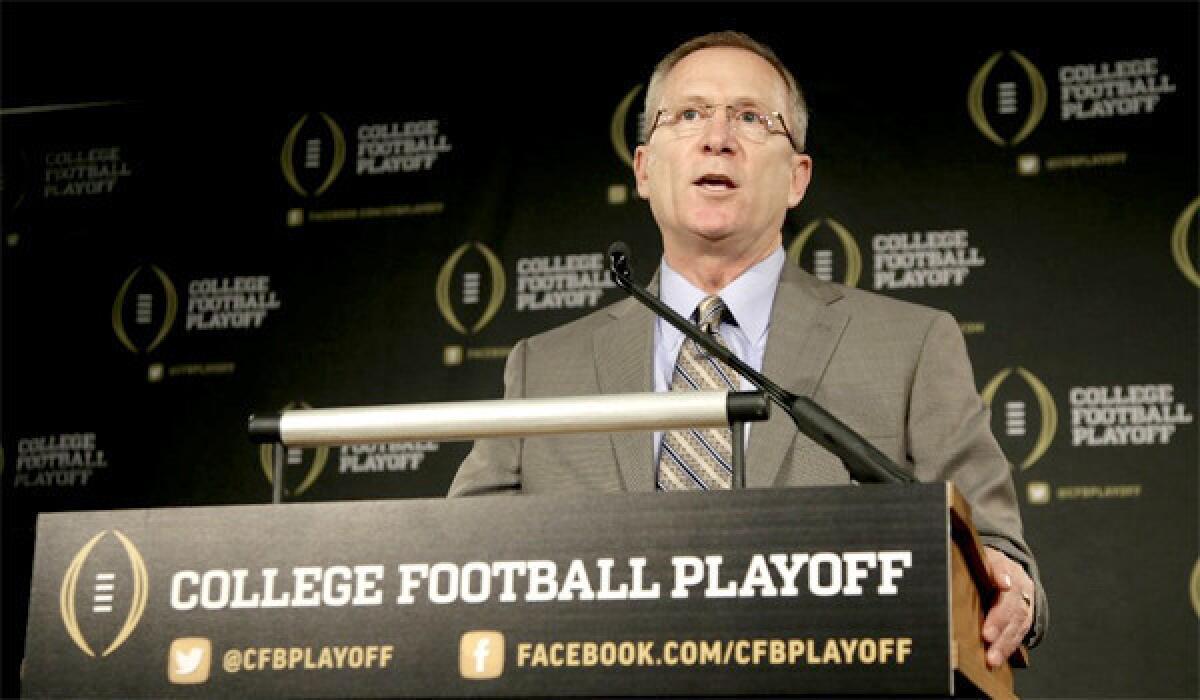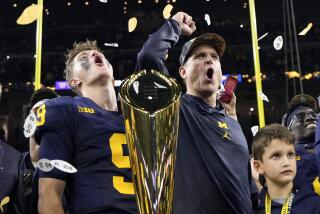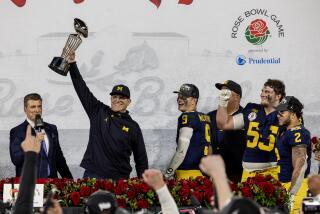With college football playoff committee in place, the real work begins

The world in 1959 was introduced to the famed Mercury 7 astronauts, who led America’s epic race to the moon.
They were “The Right Stuff.”
The world on Wednesday was introduced to an inaugural 13 members of the College Football Playoff selection committee, charged to lead America’s epic race out of BCS orbit.
If they don’t get it “right,” they may get “stuffed.”
This group should in no way be confused with our space heroes of yesteryear even though the committee does include Mike Gould, a lieutenant general from the Air Force.
We’ll soon see, though, if getting to the moon was easier.
The panel, starting next year, has the arduous task of picking the top four teams in college football.
“There will be people upset,” playoff Chairman Jeff Long guaranteed on an introductory conference call.
The idea of a selection committee sounds promising because it replaces the demonized Bowl Championship Series.
It’s feasible to think 13 people can sit around a table and select four teams with less nuclear fallout than a system that used polls and computers to pick two teams.
That system was so wacky that, in 2003, it left No. 1 USC out of the title game.
Those who are worried this is just another scam designed to help the Southeastern Conference win national titles have no reason to be worried … oh, wait.
The BCS was created and implemented by former SEC commissioner Roy Kramer and the standings, for years, were run out of the league office in Birmingham, Ala.
The new system will be chaired by Long, the athletic director at SEC-member Arkansas.
Also on the committee is Archie Manning, a Mississippi grad who sent one of his quarterback sons to Ole Miss and the other to Tennessee.
“I can do it,” Archie said Wednesday when asked if he can be impartial.
The SEC is thrilled because the new system allows all four playoff schools to be from the same league (the BCS permitted only two schools from each conference in the major bowls).
The SEC, with a record eight schools in this week’s Associated Press poll, must be licking its chops for 2014-15.
In truth, College Football Playoff Executive Bill Hancock and the commissioners assembled a stellar panel of distinguished scholars and citizens.
The committee includes Athletic Directors Pat Haden (USC), Barry Alvarez (Wisconsin), Oliver Luck (West Virginia), Long (Arkansas) and Dan Radakovich (Clemson).
They join longtime NCAA events Chairman Tom Jernstedt, Manning, former Big East commissioner Mike Tranghese and former coaches Tom Osborne (Nebraska) and Ty Willingham (Stanford, Notre Dame, Washington).
Condoleezza Rice, a Stanford professor and former Secretary of State, lends her services along with Gould, a former Air Force superintendent who once studied at the National War College.
Some might question the inclusion of former USA Today sportswriter Steve Wieberg, but those who know him can attest there is no one more qualified or square-egg diligent.
Wieberg says he brings an “educated eye” to the process as someone who has covered college sports for three decades.
That said, he’s never faced this kind of deadline.
Rice discounted former Auburn coach Pat Dye’s claims she wasn’t qualified because she never drew plays in the dirt.
“Not everyone on this committee, including me, has played football,” she said.
Rice said she is used to taking heat and added, “I don’t feel I’m carrying a banner for anyone except those of us who love college football.”
Haden is a former Rhodes Scholar and Luck was nominated.
The problem isn’t with the people, though, it’s with the premise.
The committee has been modeled after the NCAA basketball selection committee, with a notable difference.
The basketball panel picks 68 teams, not four. The potential national champion never gets left out.
That won’t be the case in football. The No. 5 team can reasonably argue it could have won it all if only given the chance.
“Identifying three and four versus five, six, seven and eight will be very difficult,” Osborne, who coached three national championship teams at Nebraska, acknowledged.
In 2004, a national BCS scandal erupted at the 4-5 spot when Texas edged out California for the right to go to the Rose Bowl.
In 2008, many thought No. 5 USC was the best team in the country at the end of the season.
In 2009, Florida finished No. 5, one spot behind Texas Christian. How do you think that would fly with the SEC?
One current BCS-level athletic director privately worried the committee will not have enough time to absorb last-weekend convulsions.
In 2007, remember, Louisiana State rose from No. 7 to No. 2 in the BCS standings on the final weekend.
Committee members will not be paid and will be asked to put in long hours.
The panel has promised transparency but hasn’t figured out yet what that means.
It will release at least four top-25 polls during the season to replicate the week-to-week excitement the BCS standings created.
The unassailable makeup of the committee also won’t stop fans from finding personal biases among the members.
The problem is everyone associated with college football is conflicted in some manner.
There will be rules about members and their affiliated schools, but some panelists are associated with many schools.
UCLA fans are naturally going to be suspicious of Haden, while Oklahoma might suspect any decisions made on their team by Osborne.
Alvarez, Wisconsin’s former coach and current AD, played at Nebraska and was an assistant coach at Notre Dame.
Tranghese, the former Big East commissioner, was incensed when the ACC plundered his league of Miami, Virginia Tech and Boston College.
Can he be unbiased when it comes to the ACC?
Cal fans, who got badly BCS-burned in 2004, will note Stanford is heavily represented by Rice and Willingham.
“We’re checking our loyalties at the door,” Manning assured.
The problem is no one really knows how, or if, the selection committee will work.
And just saying it’s better than the BCS is not, at this point, particularly comforting.
Twitter: @dufresnelatimes
More to Read
Get our high school sports newsletter
Prep Rally is devoted to the SoCal high school sports experience, bringing you scores, stories and a behind-the-scenes look at what makes prep sports so popular.
You may occasionally receive promotional content from the Los Angeles Times.







